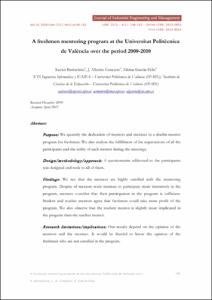Mostra el registre d'ítem simple
A freshmen mentoring program at the Universitat Politècnica de València over the period 2000-2010
| dc.contributor.author | Barrachina, Xavier |
| dc.contributor.author | Conejero, J. Alberto |
| dc.contributor.author | García Félix, Eloína |
| dc.date.accessioned | 2011-06-07T17:51:38Z |
| dc.date.available | 2011-06-07T17:51:38Z |
| dc.date.issued | 2011-04 |
| dc.identifier.citation | Barrachina, Xavier; Conejero, J. Alberto; García Félix, Eloína. A freshmen mentoring program at the Universitat Politècnica de València over the period 2000-2010. "Journal of Industrial Engineering and Management", vol. 4, núm. 1, p. 146-162. |
| dc.identifier.issn | 2013-0953 |
| dc.identifier.uri | http://hdl.handle.net/2099/10456 |
| dc.description.abstract | Purpose: We quantify the dedication of mentors and mentees in a double-mentor program for freshmen. We also analyze the fulfillment of the expectations of all the participants and the utility of each mentor during the meetings. Design/methodology/approach: A questionnaire addressed to the participants was designed and took to all of them. Findings: We see that the mentees are highly satisfied with the mentoring program. Despite of mentors want mentees to participate more intensively in the program, mentees consider that their participation in the program is sufficient. Student and teacher mentors agree that freshmen could take more profit of the program. We also observe that the student mentor is slightly more implicated in the program than the teacher mentor. Research limitations/implications: Our results depend on the opinion of the mentors and the mentees. It would be fruitful to know the opinion of the freshmen who are not enrolled in the program. Practical implications: Our research confirms the validity of the system. We hope that our conclusions will be fruitful for other institutions that would like to implement a double-mentor program for freshmen. Originality/value: Many mentoring programs have been designed basing on a big brother/sister system. We analyze the development of a double-mentor program. The last law concerning university students, approved in Spain in 2011, indicates that mentoring programs should be designed in the frame of every degree, and they should be conducted by teachers and by technical staff. With our formula, both approaches are combined. |
| dc.format.extent | 17 p. |
| dc.language.iso | eng |
| dc.publisher | School of Industrial and Aeronautic Engineering of Terrassa (ETSEIAT). Universitat Politècnica de Catalunya (UPC) |
| dc.rights | Attribution-NonCommercial-NoDerivs 3.0 Spain |
| dc.rights.uri | http://creativecommons.org/licenses/by-nc-nd/3.0/es/ |
| dc.subject | Àrees temàtiques de la UPC::Ensenyament i aprenentatge::Gestió i planificació educativa |
| dc.subject | Àrees temàtiques de la UPC::Ensenyament i aprenentatge::Ensenyament universitari |
| dc.subject.lcsh | College students |
| dc.subject.lcsh | Tutors and tutoring |
| dc.subject.lcsh | Education--Experimental methods |
| dc.subject.other | Freshmen |
| dc.subject.other | Mentoring program |
| dc.subject.other | Management education |
| dc.subject.other | First years programs |
| dc.title | A freshmen mentoring program at the Universitat Politècnica de València over the period 2000-2010 |
| dc.type | Article |
| dc.subject.lemac | Estudiants universitaris |
| dc.subject.lemac | Tutors i tutoria (Educació) -- Ensenyament universitari |
| dc.subject.lemac | Educació universitària -- Planificació |
| dc.identifier.dl | B-28744-2008 |
| dc.description.peerreviewed | Peer Reviewed |
| dc.rights.access | Open Access |
| local.citation.author | Barrachina, Xavier; Conejero, J. Alberto; García Félix, Eloína |
| local.citation.publicationName | Journal of Industrial Engineering and Management |
| local.citation.volume | 4 |
| local.citation.number | 1 |
| local.citation.startingPage | 146 |
| local.citation.endingPage | 162 |
Fitxers d'aquest items
Aquest ítem apareix a les col·leccions següents
-
2011, vol. 4, núm. 1 [7]
Special Issue – Rethinking Industrial Engineering Higher Education in the European Area (EHEA)


